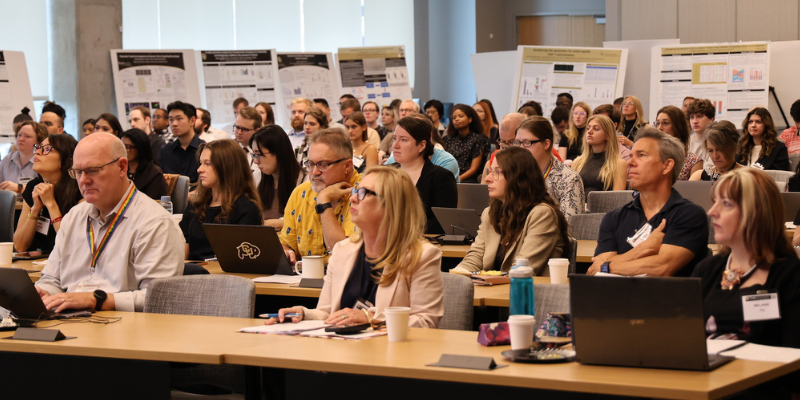It's been said that two heads are better than one. That adage is especially true when it comes to scientific research and harnessing some of the most brilliant minds in the field. That collaborative spirit of discovery is the inspiration behind the Skaggs Scholars Program established in 2011.
Centered at the University of Colorado Anschutz Medical Center and funded by a generous grant from The ALSAM Foundation, the Scholars Program is designed to stimulate collaborative research between University of Colorado (CU) pharmacy faculty members and faculty members at one or more of the six other Skaggs-affiliated institutions: the University of Arizona, College of Pharmacy; the University of California at San Diego, Skaggs School of Pharmacy and Pharmaceutical Sciences; the Idaho State University, College of Pharmacy; the University of Montana, Skaggs School of Pharmacy; the Scripps Research Institute/Skaggs Institute for Chemical Biology; and the University of Utah, College of Pharmacy.
According to its director, Louis Diamond, PhD, Dean Emeritus, the Skaggs Scholars Program has awarded 38 grants totaling nearly six million dollars to pharmacy faculty members at the University of Colorado and their colleagues at the six other Skaggs-affiliated institutions.
“By virtually any measure one might choose to adopt, the Skaggs Scholars Program has been a remarkable success,” Dr. Diamond said.
Nearly 100 percent of grant recipients have remained in academic positions since receiving their award, and many have earned promotions or experienced other types of significant career advancements. Several dozen peer-reviewed publications have emerged from Skaggs-supported research projects. And in Colorado alone, faculty members who received Skaggs Scholars Program grants have gone on to secure approximately 20 million dollars in additional funding for their research endeavors.
The 2021-2023 Skaggs Scholars Program award recipients from the University of Colorado Skaggs School of Pharmacy
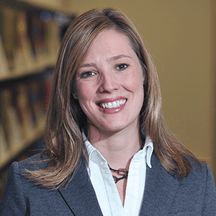
Dr. Heather Anderson, PhD, Associate Professor |

Dr. Christina Aquilante, PharmD, Professor |
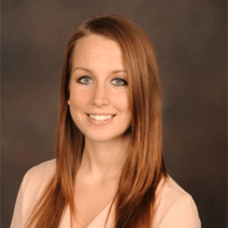
Dr. Kristina Brooks, PharmD, Assistant Professor |

Dr. Shaodong Dai, PhD, Associate Professor |
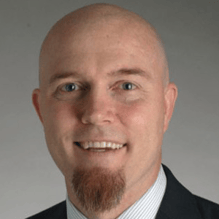
Dr. Jed Lampe, PhD, Assistant Professor |
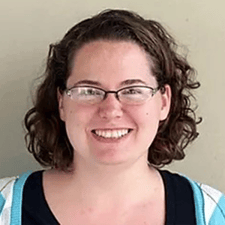
Dr. Vanessa Phelan, PhD, Assistant Professor |

Dr. Laura Saba, PhD, Associate Professor |
The Collaborative Research Projects for 2021-2023
DEPRESSION & ELECTRONIC HEALTH RECORDS
Dr. Heather Anderson, PhD, Associate Professor, Pharmaceutical Outcomes Research PhD Program Director
Use of electronic health record (EHR) data in observational research has the potential to inform depression treatment effectiveness and safety in real-world settings. A challenge of using EHR data within observational studies is the inability to thoroughly account for depression severity, which may result in misclassification of exposures and outcomes and biased results. We will leverage EHR data from the University of Utah and the University of Colorado health systems to: describe the extent of missing depression severity information in the EHR; use machine learning to predict depression severity missing from EHR data; and demonstrate the utility of using machine learning to predict missing depression severity in the EHR by applying the methods to a retrospective cohort study to answer a drug effectiveness and safety question.
PHARMACOGENOMICS & UNDERSERVED COMMUNITIES
Dr. Christina Aquilante, PharmD, Professor, Pharmacogenomics Implementation Committee Colorado Co-Chair
Title: Advancing the Clinical Integration of Pharmacogenomics in Rural and Underserved Communities. Brief overview: Pharmacogenomics is increasingly being integrated into daily clinical practice settings, largely facilitated by clinical informatics tools. However, this progress has mainly taken place in academic medical centers and resource-intensive environments. The goal of this research project is to evaluate barriers to and facilitators of using clinical informatics tools for pharmacogenomics implementation in rural and underserved communities, with the long-term goal of making pharmacogenomic-based care more accessible to a wider spectrum of patients.
HIV & PREGNANCY
Dr. Kristina Brooks, PharmD, Assistant Professor-Research
Dr. Brooks will examine factors that affect plasma and cellular concentrations of tenofovir alafenamide (TAF), a commonly used HIV medication, in pregnant and postpartum women with HIV. She is working in collaboration with Drs. Jeremiah Momper, Brookie Best, and Edmund Capparelli at the University of California San Diego on this award. They will analyze available samples and data from the Colorado Antiviral Pharmacology Laboratory and IMPAACT P1026s/2026 in support of this work. Ultimately, these investigations will help inform future mechanistic studies behind pregnancy-related changes in drug exposures and help optimize care in pregnant women with HIV.
DIABETES TREATMENT
Dr. Shaodong Dai, PhD, Associate Professor
Type 1 diabetes (T1D) is one of the most common incurable autoimmune diseases. With TD1, T cells mistakenly attack the insulin-producing beta cells in pancreatic islets leading to diabetes. Dr. Dai’s group has established the molecular basis of the T cell epitopes presentation by antigen-presenting cells and generated monoclonal antibodies that specifically suppressed the T cells activations by blocking the interactions between the epitopes and T cell receptors. In this collaboration project with Dr. Chen at Utah University, they aim to explore the feasibility to use the antibody to execute potent antigen-specific T cell suppression, in combination with the activation status-specific suppression of diabetogenic T cells, since only activated T cells exert autoimmune attack. The T cell immune checkpoint protein, Programmed death-1 (PD-1) expressed on activated T cells will be used as a target for activated, pathogenic T cells. The development of a novel T1D immunotherapy that synergizes antigen- and activation status-specific suppression of diabetogenic T cells will likely be potent, specific, and safe.
CYSTIC FIBROSIS TREATMENT
Dr. Jed Lampe, PhD, Assistant Professor
One of the most common bacteria that infects cystic fibrosis (CF) patient lungs is called Pseudomonas aeruginosa. In order to better survive and reproduce in the environment of the CF patient lung, P. aeruginosa produces a biofilm, which is a slimy layer composed of bacterial fats, sugars, proteins, and DNA. To begin producing the biofilm, the bacteria produces small “quorum sensing” molecules known as oxylipins that act to signal the other nearby bacteria that it is time to start producing the molecules needed for the biofilm. In our preliminary work, we have identified an enzyme from P. aeruginosa, CYP168A1 that we believe may be responsible for producing the oxylipins that allow P. aeruginosa to form biofilms. This proposal aims to confirm the hypothesis and characterize CYP168A1 functionally and structurally. Understanding how CYP168A1 produces these quorum-sensing molecules in P. aeruginosa and determining its structure will allow us to design drugs that can prevent it from producing the quorum-sensing molecules, which will give antibiotics that are currently used to treat CF patients a better chance to work. Ultimately, the research proposed here will maximize our potential to develop new drugs to treat CF patients that suffer from recurrent P. aeruginosa infection and improve their quality of life.
ANTIMICROBIAL RESISTANCE
Dr. Vanessa Phelan, PhD, Assistant Professor
Due to antimicrobial resistance, common and life-threatening infections are increasingly becoming untreatable. One way pathogenic microbes interact with each other is through metabolic cooperation, which leads to increased tolerance to antimicrobial drugs. In collaboration with Dr. William Gerwick at the University of California San Diego, we will apply Small Molecule Accurate Recognition Technology (SMART), an artificial intelligence-based tool for NMR spectroscopy, to live cultures of pathogenic microbes in order to examine the key molecules involved in mediating antimicrobial resistance and tolerance in polymicrobial infections.
SUBSTANCE USE DISORDERS
Dr. Laura Saba, PhD, Associate Professor
Substance use disorders (SUDs) are a serious problem in the United States and around the world and treatment of SUDs varies from patient to patient based on circumstance and is often unsuccessful. The goal of this grant is to augment current statistical methods and data sets used for matching the information on molecular changes induced by FDA-approved medications to molecular differences observed in SUD-related samples for the identification of a new use for old drugs, i.e., drug repurposing. Although this approach to drug repurposing has been successful in the past for other diseases/disorders, SUDs have a unique set of complications (extreme differences in symptoms, common comorbidities, and organ toxicity) that make it necessary to rethink our current approach to drug repurposing based on molecular profiles.
About the Awards
Competitive grant awards are made to faculty members at the CU Skaggs School of Pharmacy who have made collaborative arrangements with researchers at one or more of the above-named Skaggs institutions. The program encourages submission of proposals from a wide range of disciplines including, but not limited to: basic pharmaceutical/biomedical science, clinical/translational science and health outcomes research. Proposals that are interdisciplinary in nature; that involve high-risk, high-reward ideas that may lead to breakthrough discoveries; that are directed towards innovations in therapy and acceleration of the transfer of scientific research to the bedside of patients; or that bring together junior investigators with established senior researchers, are particularly welcomed. Proposals are reviewed on the basis of originality, scientific merit and significance, strength of the collaborative effort, qualifications of the investigators and the potential for future funding.
About the Foundation
The ALSAM Foundation, a charitable institution established in 1984 by the late L.S. “Sam” Skaggs and his wife Aline, has supported multiple research and educational programs across the western United States. The University of Colorado Skaggs School of Pharmacy and Pharmaceutical Sciences is especially fortunate to have had a decades-long philanthropic partnership with The ALSAM Foundation, which continues to this day. The school’s current building on the Anschutz Medical Campus, as well as its previous building on 8th Avenue in Denver, were made possible in large part by the generosity of The ALSAM Foundation.




